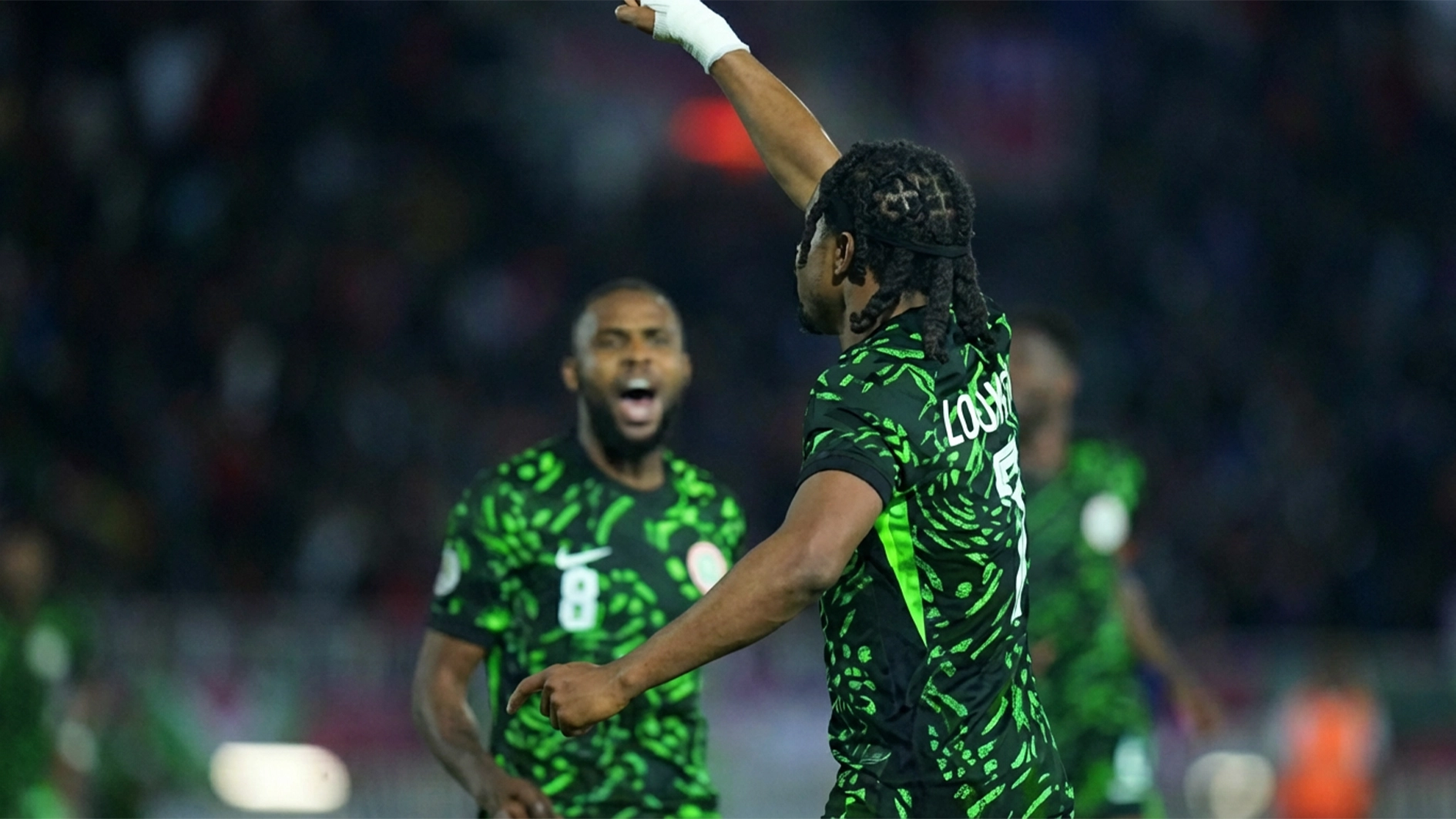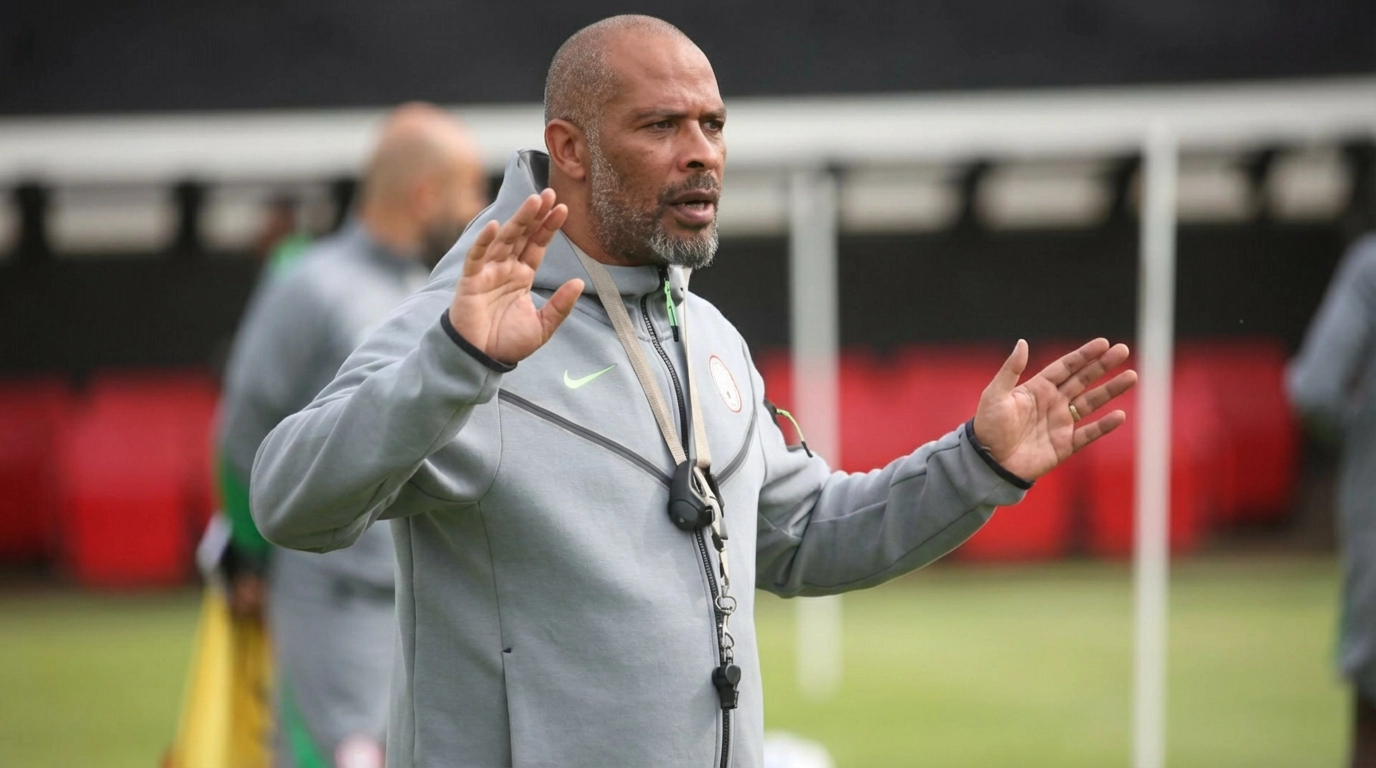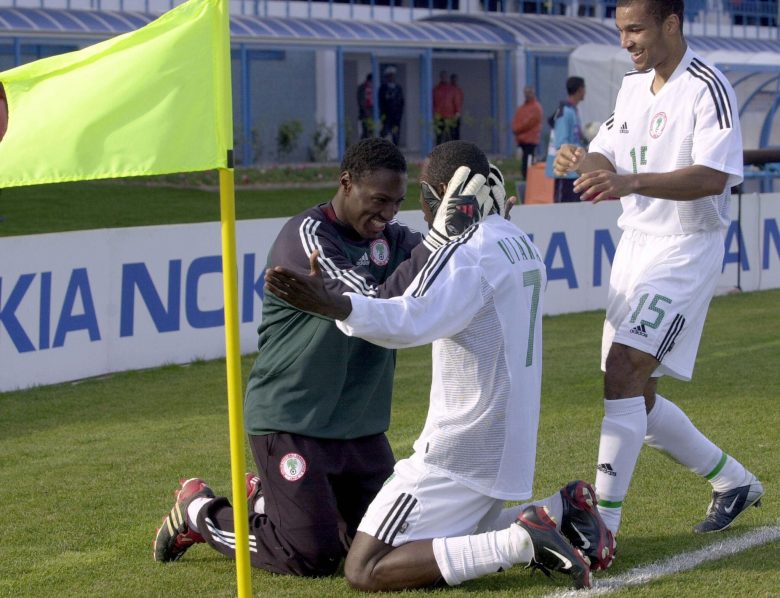
Cast your minds back to that eventful AFCON 2004 Sunday afternoon quarter final cracker at the Ben Jannet and recollect that lung-bursting 30-yard run from an electric no.7 who left millions of Nigerians lost in euphoria at the sight of Cameroon’s Idris Kanemi sprawling to the ground after being beaten at his near post to what was the winner of a titanic AFCON encounter in the Tunisian city of Monastir.
Finally, Nigeria had avenged their AFCON final defeat in Lagos from four years earlier, sending tournament favourites and reigning champions the Indomitable Lions out of the competition. Who was that player behind it all? None other than the technically brilliant but often overlooked John Utaka – a player blessed with pace, power, balance and a wicked right foot to booth.
“The Attacker” will go down in history as one of the most underrated Nigerian players ever produced having spent most of his career chocked to the wings by his clubs and national team even when he never was a natural winger.
Despite producing decent numbers upfront as a striker, Utaka was never really trusted to be your archetypal No.9 for long periods of time in most of the teams he played for.

Born in Enugu just two years after Nigeria conquered the continent with their maiden AFCON title triumph, Utaka grew up like every other child in eastern Nigeria with dreams of donning the white shirt of the iconic Enugu Rangers football club and he would get his wish and represent the Flying Antelopes in the 97/98 season, making six appearances and scoring two goals.
He would secure a move to Egyptian side Arab Contractors – now El Mokawloon – for a season, scoring five goals in 25 games before sealing a big move to Egyptian powerhouses Ismaily were he became a cult figure, after two seasons at the club and scoring 30 goals in 42 games – including 17 goals in 21 matches in his final season in Egypt, helping the club to a league and cup double in the process in the 2000/2001 campaign.
Utaka would be snapped for a then record $1 million dollars by Qatari giants Al-Sadd, scoring yet another impressive 14 goals in 27 games in his only season in the Middle East as the Doha-based side finished in a disappointing 4th place. Utaka would eventually get his maiden Super Eagles call up and debut as a substitute in June 2001 following the Super Eagles 2-0 Africa Cup of Nations qualifying win against Namibia in Windhoek.
A couple of call-ups later would see the silky operator included on the list to the Far East for the 2002 FIFA World Cup amidst controversial circumstances, with two-third of the players used during the qualifying campaign for Korea/Japan disbanded just after the AFCON that February. The players were at the forefront of an impasse with the NFA and the Sports Minister over unpaid allowances and bonuses, sending experienced campaigners like Finidi George, Tijani Babangida, and Sunday Oliseh into an early and acrimonious retirement.
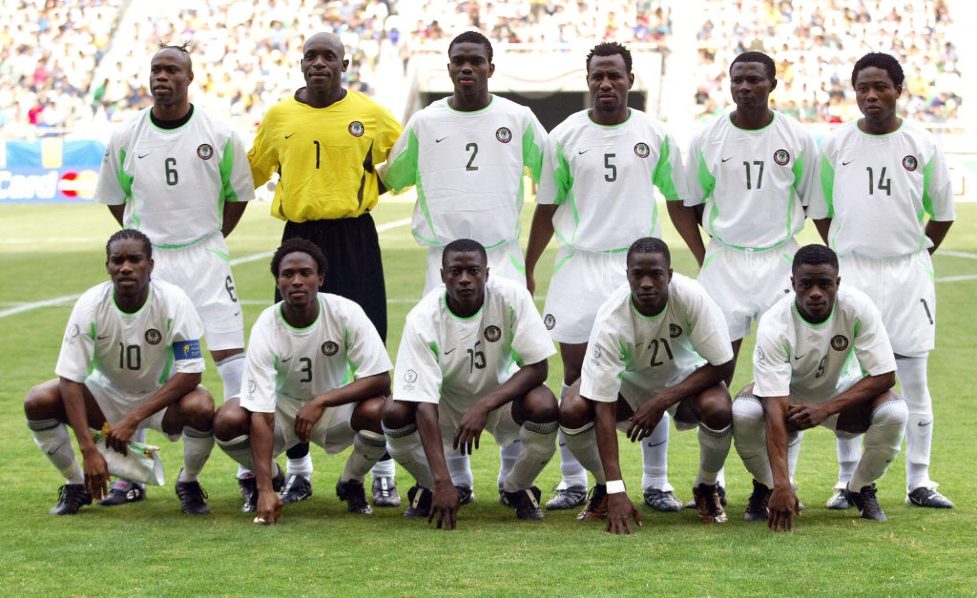
With the 2002 World Cup on the horizon, Utaka would appear in friendlies against Kenya and Scotland in a side tinkered by the enigmatic Adegboye Onigbinde and eventually playing the full 90 minutes out wide against Sweden in a 2-1 loss that bundled the Super Eagles out of the World Cup at the group stage for the first time. Nigeria’s dismal performance didn’t hold Utaka back as he was signed by French side RC Lens that summer with the chance of playing at the club’s second ever UEFA Champions League campaign. Utaka made his debut away against SC Bastia in a 1-1 draw, coming on as a late substitute and got his maiden goal in a 2-2 comeback away draw at Nantes in late August.
In March 2003, Utaka scored his first ever international goal with a perfectly executed half volley in the 11th minute in the now famous “Battle of Blantyre” match, which Nigeria held on to beat Malawi 1-0 in an AFCON 2004 qualifier.
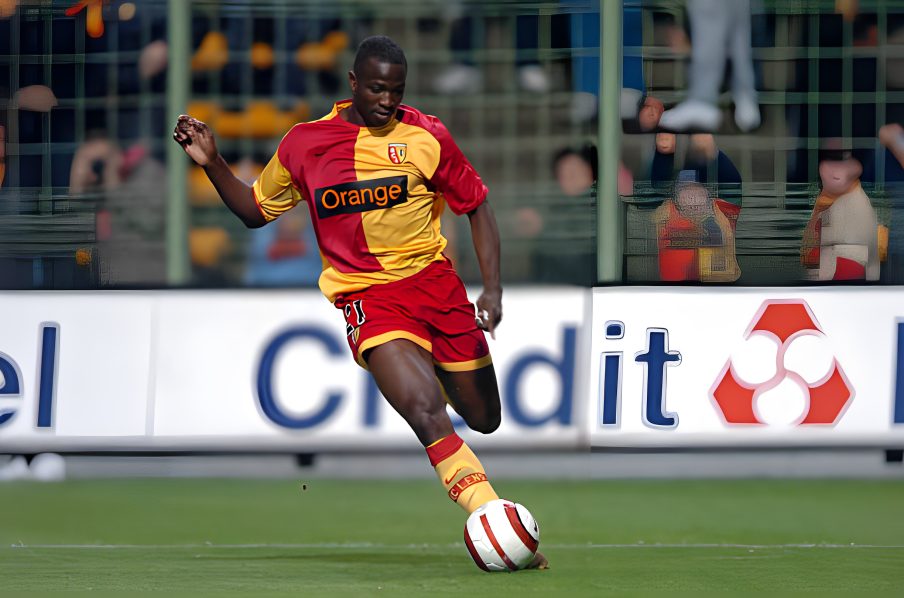
Now an established starter in the national team, Utaka would go on to score eight goals in 36 appearances in the league for Lens that season but it was in Europe that he shone like a million stars, as he grabbed two goals, famously scoring the winner over AC Milan a in a 2-1 win and scoring in a 1-1 draw with Bayern Munich all at home.
His four assists in Lens’ valiant group stage exit finishing only just behind illustrious names like Pablo Aimar and Juan Riquelme for most assists in the 2002/2003 champions league season.
The 2003/04 season would be less eventful as the attacker only scored a paltry four goals in 34 appearances for the club and would miss crucial parts of the season due to his involvement at AFCON 2004 were he contributed to an assist and two goals as the Super Eagles finished third for the second AFCON in a row.
At the end of the season, Utaka would go on to play in a couple of friendly games for Nigeria at the Unity Cup invitational – contributing with a goal and assist as Nigeria beat the Republic of Ireland and Jamaica at the Valley stadium, Charlton to win the now defunct tournament.
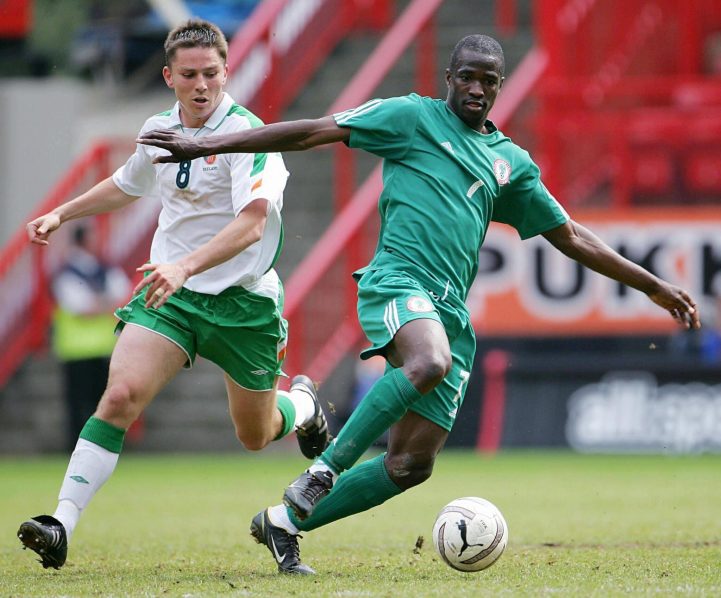
The Attacker would play as a strike partner to one-time kid sensation Bartholomew Ogbeche against the Reggae Boyz which produced a man-of-the-match performance, showing for the first time what the Enugu-born star could do up front away from the wings.
The 2004/05 season would be Utaka’s last season with Le Sang et Or (The Blood and Gold) and also his most prolific time in Europe ever as he reached double figures for the first time with 12 goals in 34 Ligue 1 games, with his most memorable performance being a perfect hat-trick in a 5-2 hammering of future club Stade Rennais, on a chilly night in May 2004 at the Stade Bollaert-Delelis.
His first goal was heavenly and is by far the best goal scored by “the attacker” in a Lens jersey. A drag back and cross from the left by Gabonese tank Daniel Cousin met Utaka in the box faced with his back to goal…he controlled the cross with his chest and unleashed an unstoppable overhead kick with his left foot past Rennes and Swedish goalkeeper Andreas Isaksson to send the home fans into delirium. He contributed with two other goals with his right foot and his head before assisting the fourth to cap a magnificent man-of-the-match performance that had the French media talking for days.
With transfer rumours circulating at the season’s end, English sides monitored the situation as well as top French teams but Utaka joined the team he had only recently scored a hat-trick against weeks back, Stade Rennais, on a four-year contract. He was brought in to be a strike partner to the club’s top scorer, Swiss talisman Alexander Frei and with a chance of challenging as well as playing in Europe consistently.

His experience at the Brittany side would be littered with special memories but Utaka and Rennes would have a poor start to the season as his debut ended in a 3-0 home loss to Nantes. Rennes will eventual curb their bad start to the season with a 3-2 win over Taye Taiwo’s Marseille that August with Utaka getting his first goal for the side with a bullet header past Cedric Carrasso and also contributing with an assist for strike partner Frei.
Internationally, Utaka was part of a Super Eagles side that failed to qualify for Germany 2006 after Angola qualified for the World Cup at the Super Eagles expense by whiskers and in January 2006, the national team looked to make amends with the aim of glory at a familiar territory to Utaka; Egypt – for the 2006 AFCON. Yet another bronze medal greeted the Super Eagles best efforts in what was the international swansong of Nigerian great Jay Jay Okocha and midfield stalwart Garba Lawal.
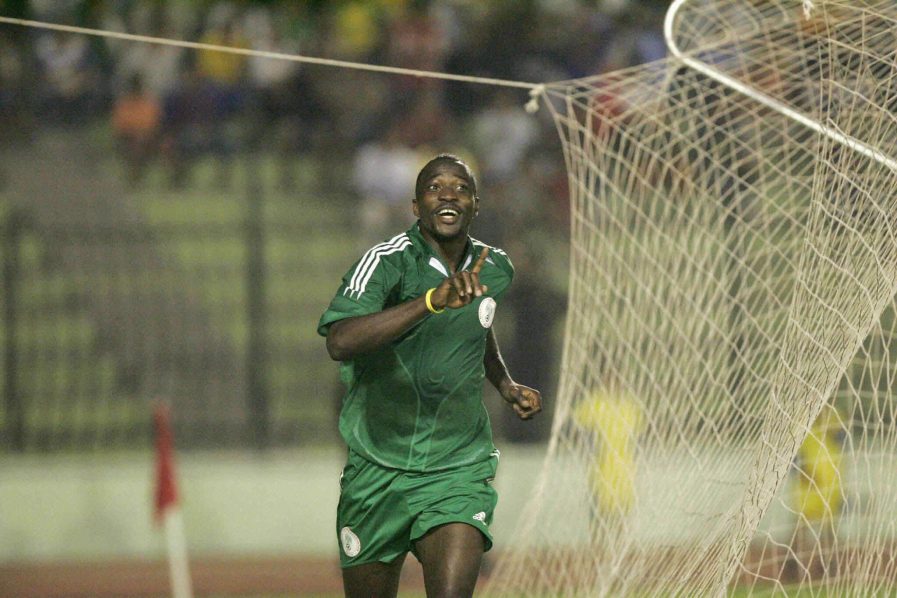
That winter, Utaka missed five games and Rennes lost all five games in his absence and fell from 10th place to 14th on the log. On returning to France, the next two fixtures would showcase the predatory instinct of Utaka as he hit two hat-tricks from two matches against former club RC Lens at Roazhon Park and away at the Stade Gerland to reigning champions Olympique Lyon while playing as the lone striker, in the absence of club marksman and strike partner Frei through injury for those two games. His debut season in Rennes produced 11 goals in 28 matches and transfer rumours stirred yet again but Rennes rejected offers especially from England, though Utaka seemed determined.
Rennes manager at the time Pierre Dreossi seemed resigned to losing Utaka, speaking to France Football, Dreossi pointed out “John Utaka is susceptible to leave and is motivated to leave, so it will be difficult for him to return here, but the offer we have had are not sufficient.”
Utaka stayed on for the 2006/2007 season and maintained a decent 11 goals in 35 games including 4 goals in one Coupe de France game against lower division side SR Colmar and this time around, Utaka would leave for a record £7 million to Premier league side Portsmouth, becoming the club’s record signing in the process. Utaka spoke about his love for English football and also credited the influence of Nigerian icon and teammate Nwankwo Kanu amongst the reasons he joined Pompey while speaking to Sky Sports at the time, “Kanu has been a good friend at the national team…he spoke to me about the team, the fans, the coach and finally I’m here.”

Utaka hit the ground running on his debut against Derby County away at Pride Park with a goal and assist in a 2-2 draw. He would score his second goal for the club at Fratton Park with a solo run from the half way line after being set up by Kanu’s through ball and within seconds went past two defenders in blistering fashion, rounding Jussi Jaskelainen and slotting home the opener on the way to Portsmouth’s 3-1 win over Bolton.
Utaka along with other African players at the club would end up missing four games on AFCON duty and The Super Eagles had one of the most disappointing and uninspiring AFCON campaigns in over 40 years as they crashed out at the quarter final stage to 10-man Ghana in a thrilling encounter.
Things were not rosy for Utaka personally either at club level, with the Enugu-born star scoring only three more times after playing 30 games but it would end in bliss as Pompey won their first FA Cup in over 40 years which Utaka played a vital role in, setting up teammate and close friend Kanu’s cup-winning goal.
His second season would end up being an injury blighted one as Utaka struggled for game time and goals, only scoring two weeks to the end of the season against Sunderland at Fratton Park as Pompey finished 14th in the league.
His third season would be a nightmare with months on the treatment table, on the bench and at times out of favour by the manager altogether.
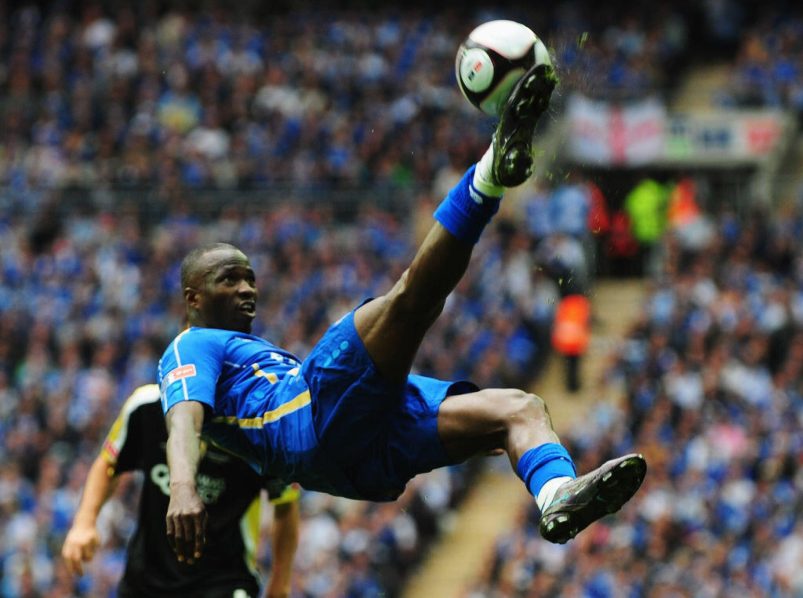
His poor record of one goal every 18 matches didn’t endear him to the Pompey fans and seeing their record signing looking like a shadow of his former self at Rennes and Lens was worrying as Portsmouth were sunk in a relegation battle all season and in dire need of goals, which made Utaka an easy target for the press for the club woes on the pitch.
Portsmouth would get relegated after the 2009/10 season having been deducted points for financial irregularities and spending majority of the season at the bottom. They would however enjoy a marvelous FA Cup run but were beaten by Chelsea in the final in Wembley.
Come end of the season, Utaka would make the 23-man list of new national team coach Lars Lagerback squad to South Africa to the surprise of many, but he didn’t make a single appearance as the Super Eagles crashed out of the 2010 World Cup in back-to-back group stages yet again.
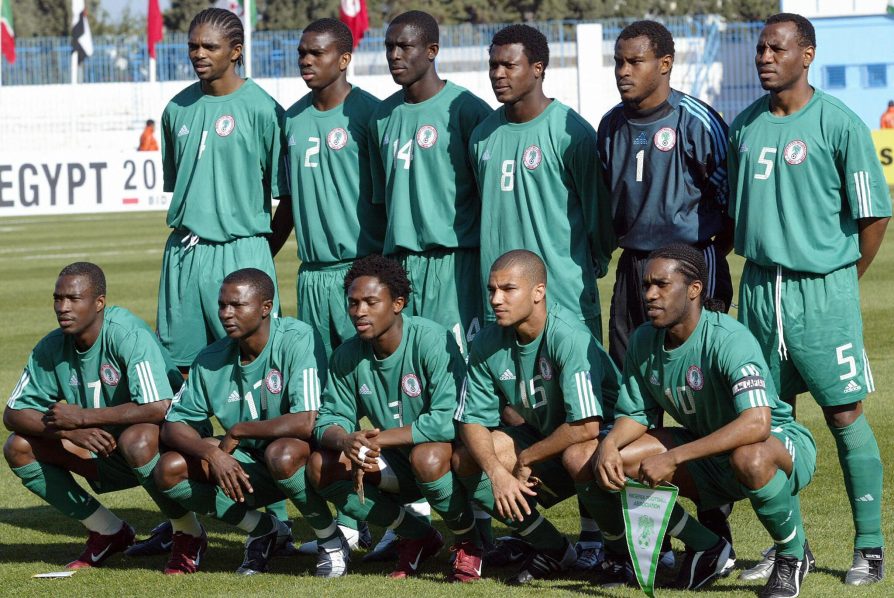
With Pompey in administration, and going into the championship, top earners like Kanu, who had just retired internationally, and Utaka were amongst those marked to be shipped out for their huge wages which impacted the club. Surprisingly both players didn’t attract any serious bids with Kanu going into the end of his final days in the game and Utaka’s former club Rennes failing to meet Pompey’s asking price.
In the championship, Utaka’s form seemed to improve with three goals and five assists going into the end of the January transfer window. On the last week of the winter transfer window, reports had it that Utaka was in talks with modest French side Montpellier, a side at the wrong end of the Ligue 1 table.
On the last day of the winter transfer window, Utaka joined Montpellier on a two-and-a-half-year deal for £500,000 to end a quite disappointing three-and-a-half-year spell at the south coast.
Now back in familiar territory, Utaka wouldn’t make his debut until late February against Sochaux in a goalless away draw, as a second half substitute. He didn’t score that season as Montpellier finished 11th on the table in only their second season back at the top flight.
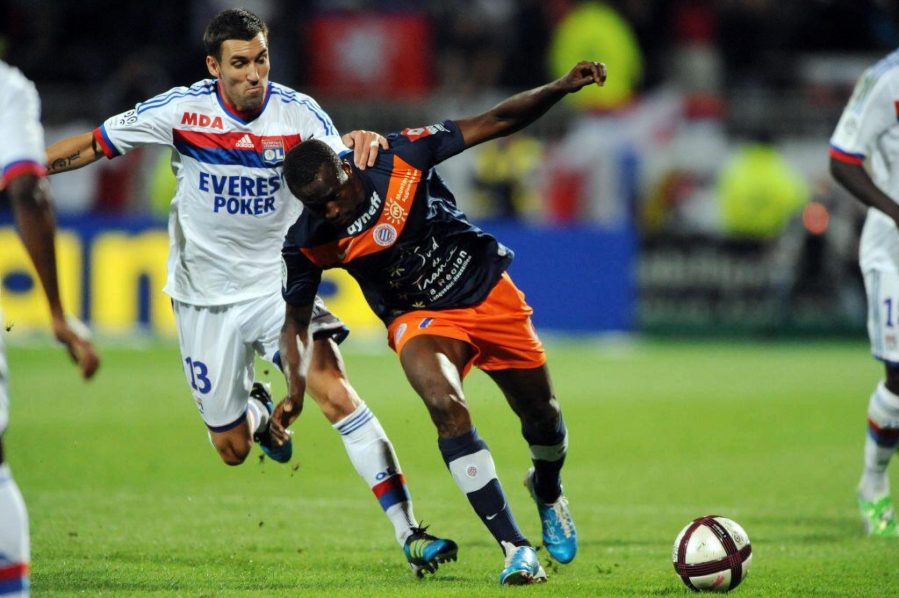
The 2011/12 season would prove magical as Utaka and a certain future World Cup winner Oliver Giroud helped the southern French side mount the unlikeliest of title challenges. The Qatari investment had just kicked in at Paris over a year ago and PSG were expected to land their first title since the 93/94 season, but it would be a season were both Montpellier and PSG would spend switching places at the top of the pile. Utaka would open his goal account after 17 games for the club and assist one of the goals in a 3-1 away win to Ajaccio. That season Utaka would end up scoring very important goals like the goal at the Parc des Prince against title rivals PSG in a 2-2 draw in mid-January that kept Montpellier’s title hopes still intact and also score the only goal at Stade de la Mosson less than a week later against Bordeaux.
Utaka’s crowning moment was perhaps the final day of the season where Montpellier needed to win to have any chance of winning the league with both Montepellier and PSG separated by just three points going into the final day of the season.
PSG who posessed a superior goal difference had won an earlier away fixture at Lorient and pressure was on Montpellier to deliver with opponents Auxerre determined to frustrate their visitors. The hosts would take an early lead but Utaka would equalize just before half time which led to numerous delays due to Auxerre fans venting their frustration with the club staring at relegation. Utaka would score the winner late in the game to give La Paillade a 2-1 win thereby etching his name in Montpellier folklore and handing the southern France side their first ever Ligue 1 title despite the presence of PSG’s financial might. A season that was hinged on league survival ended up being one that promised Champions League football for the very first time at the Stade de la Mosson.
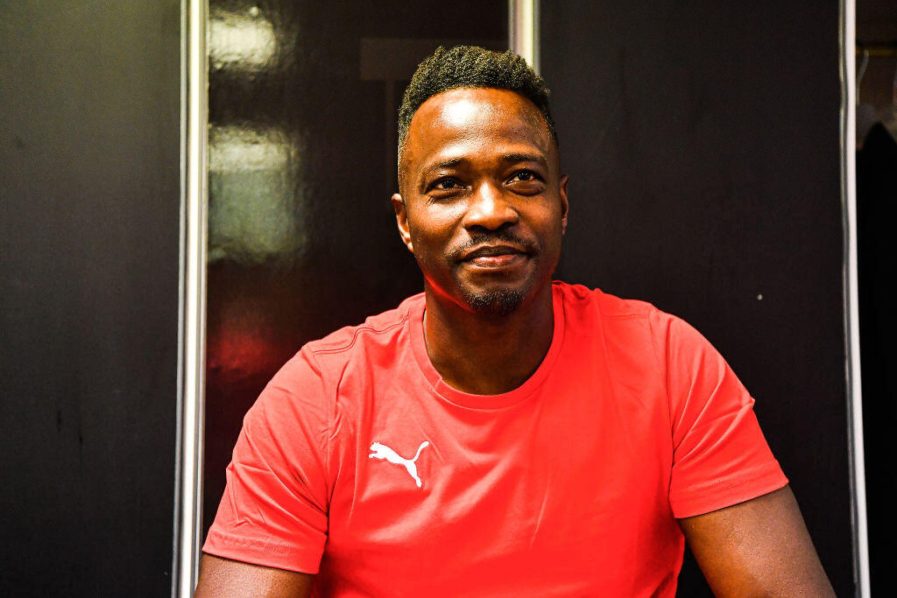
After two and a half years at Stade de la Mosson, Utaka joined Turkish side Sivasspor on a two-year deal and scored 12 times in 57 matches before spells at Egyptian sides Ismaily, Nogoom El Mostakbal, Aswan and a return to France, with French fourth division side Sedan have seen Utaka go under the radar.
Some Nigerians may argue Utaka was one player of the 2000s generation that had the potential of becoming a world beater if only he was consistent enough, an argument shared by a former teammate at Rennes, Ettiene Didot, when asked the best player he played with by Get Football News France. He opined “The best I’ve played with – there was a player who always impressed me when I was at Rennes – John Utaka. Maybe not renowned as his talent deserved, because he was inconsistent at times. But he was a player who can change matches single-handedly – he was exceptional.”
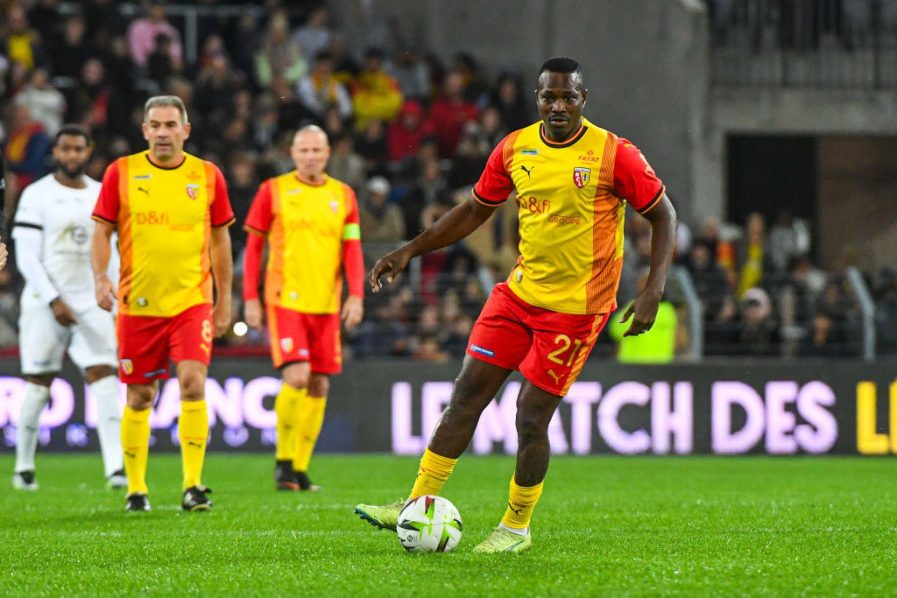
One would have to agree that the 2000s had an abundance of striking talents Nigeria had ever seen but unfortunately, some players like Utaka had to be moved to the wings to accommodate other equally talented strikers at the disposal of national team coaches, to cover for the national team’s lack of natural wingers, in contrast to the 80s and 90s.
With over 49 matches and six goals for Nigeria, it’s fair to say we never got to see the very best of Utaka internationally, considering he rarely ever played as the main striker for Nigeria unlike at club level where he would often play as the leading man with a decent goal per minute ratio. It could also be argued he played at the wrong era considering wingers of today have more licence to get into the box and score as many goals as your average Number 9 unlike his era which required more runs near the byline than into the box and crosses.
Some Nigerian football followers might feel a tad sad how things went long term for the former Super Eagle as players of his technical ability and ilk don’t come around often but when they do, it’s best they are utilized to their utmost potential than playing them out of position more often than not.
[ad unit=2]



